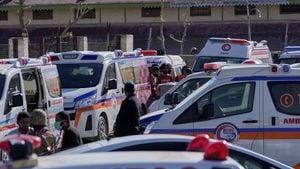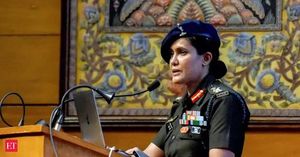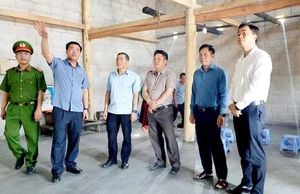French President Emmanuel Macron is set to receive Ahmed al-Charaa, Syria's new interim leader, on Wednesday, May 7, 2025, marking the latter's first visit to the European Union since the fall of Bashar al-Assad. This meeting comes six months after al-Charaa led the rebel group HTC in overthrowing Assad, and it underscores a significant shift in diplomatic relations between France and Syria.
The French presidency has stated that the invitation extended to al-Charaa is part of a "demonstration of France's historic commitment to the Syrian people who aspire to peace and democracy." Macron is expected to discuss crucial issues with his counterpart, including strategies to stabilize the region—particularly concerning Lebanon—and the ongoing fight against terrorism.
During the meeting, Macron will reiterate France's support for the construction of a new Syria—one that is free, stable, sovereign, and respectful of all components of Syrian society. This diplomatic overture comes amid ongoing sectarian violence in Syria, which has raised concerns about the new leader's ability to govern effectively.
Ahmed al-Charaa, a former jihadist linked to al-Qaeda, is likely to stir controversy with his visit. However, French Minister of Foreign Affairs Jean-Noël Barrot has emphasized the importance of engaging in dialogue with the new Syrian authorities. "It would be irresponsible not to engage in dialogue," Barrot stated, highlighting that France's security is closely tied to developments in Syria, including the fight against terrorism and the management of migration flows.
Recent events in Syria have been marked by escalating violence, particularly against the Druze community, which has seen hundreds of casualties. Just days prior to al-Charaa's visit, the French Ministry of Foreign Affairs condemned the "sectarian violence" targeting the Druze in southern Damascus, calling for an end to the clashes.
In a broader context, the European Union has recently taken steps to ease sanctions against Syria, which had been in place for nearly 14 years due to the ongoing civil war. In February 2025, the EU decided to suspend several sanctions, including those affecting key financial entities such as the Industrial Bank and the People's Credit Bank. This move aims to facilitate humanitarian aid and reconstruction efforts, reflecting a cautious rapprochement between the EU and the new Syrian authorities.
In addition to lifting restrictions, the EU has also made economic resources available to the Central Bank of Syria to support necessary financial operations. This shift in policy indicates a willingness to engage with the new leadership, provided they demonstrate a commitment to inclusive governance.
Earlier this year, in January 2025, al-Charaa met with Barrot and German Foreign Minister Annalena Baerbock in Damascus, marking the first visit by high-ranking European officials since Assad's ousting. The discussions then were seen as a positive step towards establishing a dialogue with the new Syrian regime.
However, the backdrop of violence complicates these diplomatic efforts. In March 2025, sectarian clashes resulted in over 1,700 deaths, primarily among the Alawite community, further straining the fragile situation in Syria. Reports of ongoing violence, including attacks involving Druze fighters, have raised alarms about the interim government's capacity to maintain order and prevent extremist elements from destabilizing the region.
Israel has also been active in the region, launching numerous strikes against Syrian targets since Assad's downfall. Just last week, on May 2, 2025, Israel conducted a strike near the presidential palace in Damascus, which it claimed was necessary to protect the Druze minority. The Israeli government has made it clear that it is prepared to intervene to safeguard this community amid the rising tensions.
In response to these developments, the United Nations called for an immediate cessation of Israeli attacks on Syria, urging all parties to respect the sovereignty of the nation. This situation underscores the complexity of the regional dynamics at play, as various actors navigate a landscape marked by both opportunity and peril.
As Macron prepares to host al-Charaa, the international community watches closely. The outcome of this meeting could have significant implications for Syria's future, as well as for France's role in the region. With the potential for renewed dialogue and cooperation, there is hope for a path towards stability and peace in a country long ravaged by conflict.
In conclusion, the upcoming meeting between Macron and al-Charaa represents a critical juncture in Franco-Syrian relations. It reflects France's commitment to engaging with the new Syrian leadership while grappling with the realities of violence and instability that continue to plague the region. As both leaders discuss the way forward, the hope remains that this dialogue could pave the way for a more peaceful and democratic Syria.



